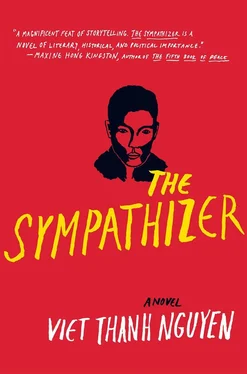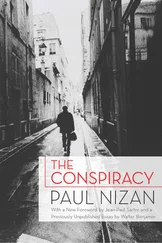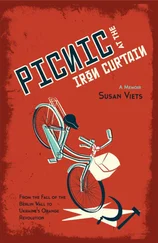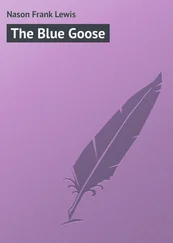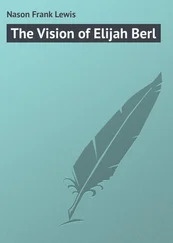When the General wandered off to find Madame and the children, I said, What’s going on here? It’s a mess. Claude sighed. Situation normal, all fucked up. Everybody’s trying to get their relatives and cooks and girlfriends out of here. Just consider yourself lucky. I know, I said. See you in the States? He clapped me on the shoulder with affection. Just like when the communists took over in ’54, he said. Who would have thought we’d be here again? But I got you out of the north then, and I’m getting you out of the south now. You’ll be all right.
After Claude left, I returned to the evacuees. A marine on the bullhorn mumbled at them to form into lines, but queuing was unnatural for our countrymen. Our proper mode in situations where demand was high and supply low was to elbow, jostle, crowd, and hustle, and, if all that failed, to bribe, flatter, exaggerate, and lie. I was uncertain whether these traits were genetic, deeply cultural, or simply a rapid evolutionary development. We had been forced to adapt to ten years of living in a bubble economy pumped up purely by American imports; three decades of on-again, off-again war, including the sawing in half of the country in ’54 by foreign magicians and the brief Japanese interregnum of World War II; and the previous century of avuncular French molestation. The marines, however, cared not a whit for such excuses, and their intimidating presence eventually coerced the refugees into lines. When the marines checked us for weapons, we officers dutifully, sadly turned over our guns. Mine was just a snub-nosed.38 revolver, good for covert activities, Russian roulette, and suicide, whereas Bon wielded the manly.45 Colt semiautomatic. The gun was designed to knock down Moro warriors in the Philippines with a single shot, I said to Duc. I had learned this from Claude; it was the kind of arcana he knew.
Papers! said the embassy bureaucrat at the desk after the weapons check, a young man with nineteenth-century sideburns, decked out in a beige safari suit and rose-tinted glasses. Each of the family heads had the laissez-passer documents from the Ministry of the Interior I had bought at a hefty discount, as well as the presidential parole delivered by Claude, stamped by the relevant embassy clerk. The parole assured us, even as we stood obediently in line, of the important thing: that we had cut to the head of the immigration queue in front of the huddled, hopeful millions from all over the world yearning to breathe free. We carried that small solace with us to the staging ground of the tennis courts, where earlier evacuees already occupied all the bleacher seats. We joined the tardier souls attempting a numb slumber on the green concrete of the courts. Red blackout lamps cast an eerie glow over the crowds, among which was a scattering of Americans. All of them appeared to be husbands of Vietnamese women, given how a Vietnamese family besieged each of them, or how a Vietnamese woman had practically handcuffed herself to his arm. I settled down with Bon, Linh, and Duc on an unoccupied plot. On one side was a covey of call girls, vacuum-packed into micro-miniskirts and fishnet stockings. On the other was an American, his wife, and their children, a boy and a girl of perhaps five and six. The husband sprawled on his back with his beefy forearm over his eyes, the only parts of his face visible the two furry limbs of his walrus mustache, his pink lips, and his slightly crooked teeth. His wife sat with her children’s heads in her lap, stroking their brown hair. How long have you been here? Linh asked, cradling a drowsy Duc in her arms. The whole day, the woman said. It’s been awful, so hot. There’s nothing to eat or drink. They keep calling out the numbers of planes but not ours. Linh made sympathetic noises while Bon and I settled down to the waiting part of hurry up and wait, the tedious custom of militaries the world over.
We lit cigarettes and turned our attention to the dark sky, every now and again illuminated by a parachute flare sputtering into spermatic existence, its bright head of light trailing a long, wiggling tail of smoke as it drifted downward. Ready for a confession? Bon said. He used words the way he used bullets, in short, controlled bursts. I knew today was coming. Just never said so aloud. That’s denial, right? I nodded and said, You’re only guilty of the same thing that everyone else in Saigon is. We all knew and we couldn’t do a thing about it, or so we thought, anyway. But anything can always happen. That’s what hope is all about. He shrugged, contemplating the end of his burning cigarette. Hope’s thin, he said. Despair’s thick. Like blood. He pointed to the scar in the palm of the hand holding the cigarette, carved to follow the lifeline’s arc. Remember?
I held up the palm of my right hand with its matching scar, the same one carried by Man. We saw this mark whenever we opened our hands for a bottle, a cigarette, a gun, or a woman. Like warriors of legend, we had sworn to die for one another, snared by the romance of schoolboy friendship, united by the eternal things we saw in each other: fidelity, honesty, conviction, the willingness to stand by friends and uphold beliefs. But what did we believe in at fourteen? Our friendship and our brotherhood, our country and our independence. We believed we could, if called upon, sacrifice ourselves for our blood brothers and our nation, but we did not know exactly how we would be called upon and what we would become. I could not predict that Bon would one day join the Phoenix Program to avenge his murdered father, his task to assassinate the people whom Man and I considered comrades. And good-hearted, sincere Bon did not know that Man and I would secretly come to believe that the only way to rescue our country was to become revolutionaries. All three of us followed our political beliefs, but only because of the reasons that led us to swear blood brotherhood in the first place. If ever circumstances forced us into a situation where death was the price of our brotherhood, I had no doubt that Man and I would pay. Our commitment was written on our hands, and under the wavering light cast by a distant magnesium flare, I held up my palm with its scar and traced the line with my finger. Your blood is mine and mine is yours, I said, which was the adolescent oath we had sworn to one another. You know what else? Bon said. Despair may be thick, but friendship’s thicker. After that, nothing more needed to be said, our camaraderie enough as we heeded the call of the Katyusha rockets, hissing in the distance like librarians demanding silence.
THANK YOU, DEAR COMMANDANT, for the notes that you and the commissar have given me on my confession. You have asked me what I mean when I say “we” or “us,” as in those moments when I identify with the southern soldiers and evacuees on whom I was sent to spy. Should I not refer to those people, my enemies, as “them”? I confess that after having spent almost my whole life in their company I cannot help but sympathize with them, as I do with many others. My weakness for sympathizing with others has much to do with my status as a bastard, which is not to say that being a bastard naturally predisposes one to sympathy. Many bastards behave like bastards, and I credit my gentle mother with teaching me the idea that blurring the lines between us and them can be a worthy behavior. After all, if she had not blurred the lines between maid and priest, or allowed them to be blurred, I would not exist.
Having been thus produced outside of marriage, I confess to feeling very uncomfortable at the thought of being married myself. Bachelorhood is one of the unexpected benefits of being a bastard, as I was not considered much of a catch to most families. Not even families with a daughter of mixed ancestry welcomed me, for the daughter was herself usually frantic to squeeze into the elevator of social mobility through marriage to someone of a pure pedigree. While friends and strangers sigh over my bachelorhood as part of the tragedy of being a bastard, I find that bachelorhood not only means freedom but also suits my subterranean life as a mole, who burrows better alone. Being a bachelor also meant I could chat without consequence with the call girls, brazenly displaying their shapely shanks among the evacuees while using yesterday’s tabloid paper to fan the sweaty ravines of their cleavage, artificially enhanced by atomic age bras. The girls called themselves Mimi, Phi Phi, and Ti Ti, common enough names in the demimonde, but as a triumvirate powerful enough to inject joy into my heart. Perhaps they invented those names on the spot, names changed as easily as customers. If so, their playacting was simply a professional reflex acquired through years of diligent study and dedicated practice. I had an abiding respect for the professionalism of career prostitutes, who wore their dishonesty more openly than lawyers, both of whom bill by the hour. But to speak only of the financial side misses the point. The proper way to approach a prostitute is to adapt the attitude of a theatergoer, sitting back and suspending disbelief for the duration of the show. The improper way is to doltishly insist that the play is just a bunch of people putting on charades because you have paid the price of the ticket, or, conversely, to believe utterly in what you are watching and hence succumb to a mirage. For example, grown men who sneer at the idea of unicorns will tearfully testify to the existence of an even rarer, more mythical species. Found only in remote ports of call and the darkest, deepest reaches of the most insalubrious taverns, this is the prostitute in whose chest beats the proverbial heart of gold. Let me assure you, if there is one part of a prostitute that is made of gold, it is not her heart. That some believe otherwise is a tribute to the conscientious performer.
Читать дальше
